 Petzlover
Petzlover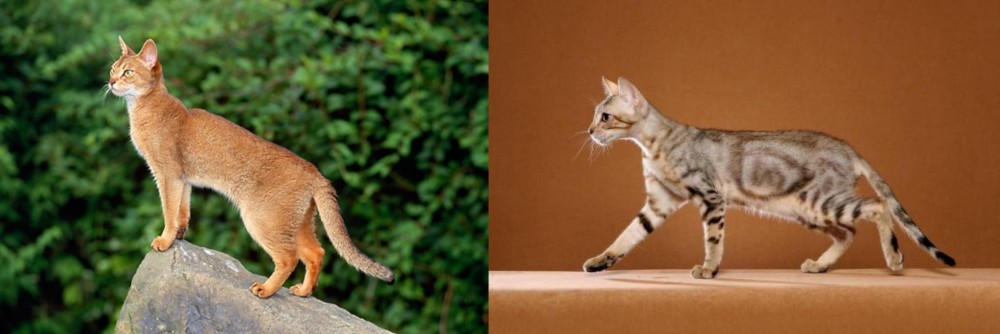 Abyssinian is originated from Ethiopia but Sokoke is originated from United States. Both Abyssinian and Sokoke are having almost same weight. Abyssinian may live 3 years less than Sokoke. Both Abyssinian and Sokoke has same litter size. Both Abyssinian and Sokoke requires Low Maintenance.
Abyssinian is originated from Ethiopia but Sokoke is originated from United States. Both Abyssinian and Sokoke are having almost same weight. Abyssinian may live 3 years less than Sokoke. Both Abyssinian and Sokoke has same litter size. Both Abyssinian and Sokoke requires Low Maintenance.
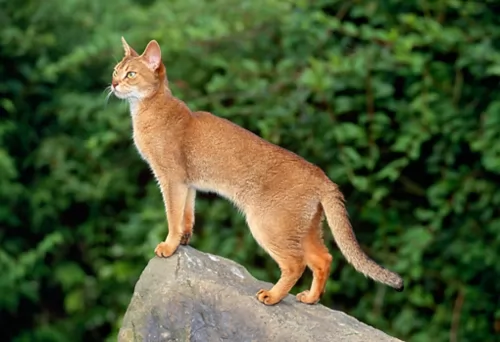 Known also as the Bunny Cat or the Abys, the Abyssinian cat hails from Abyssinia which is today known as Ethiopia.
Known also as the Bunny Cat or the Abys, the Abyssinian cat hails from Abyssinia which is today known as Ethiopia.
It is believed that the cat was brought to the UK in the 1860s. At first the cat was crossed with British Shorthairs, and later with oriental breeds.
The cat was imported in 1900 to America with some breeding programs starting in the United States in the 1930s. It is thought that it was a good thing that cats were exported to the U.S. because World War II took a toll on breed numbers but the breed was built up again in the USA.
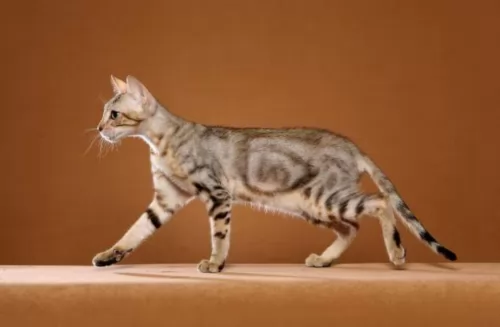 Compared to other breeds of cat, the rare Sokoke Forest Cat is a fairly new natural breed. It comes from the Sokoke district of eastern Kenya but was developed in the USA.
Compared to other breeds of cat, the rare Sokoke Forest Cat is a fairly new natural breed. It comes from the Sokoke district of eastern Kenya but was developed in the USA.
It is in fact, named after the Arabuko Sokoke National Forest, from where the wild foundation stock came from. Wildlife artist Jeni Slater started breeding these cats in the 1970s. They eventually reached Denmark, where further breeding continued, with the cat becoming popular with local cat fanciers, and laid the foundation of the breed in Europe.
Today, there are just a few breeders registered in the UK and TICA, The International Cat Association lists the Sokoke cat as a New Preliminary Race and it was recognized by FIFe in 1993.
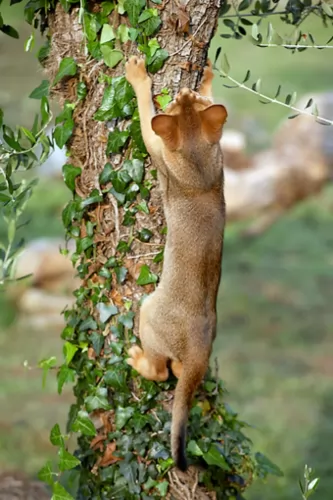 The Abyssinian is a slender, lithe, fine-boned, medium sized cat with shortish to medium length silky hair and long, slender legs.
The Abyssinian is a slender, lithe, fine-boned, medium sized cat with shortish to medium length silky hair and long, slender legs.
The fur has a distinctive ticked look. The coat comes in several colors – but its base color is a glossy reddish-brown base with black ticking.
You’ll find that the feline reaches a height of 20-25 cm and that its length is roughly 30-41 cm. When your Abyssinian is an adult it will weigh about 4-5 kg. With good care, your feline pet can reach up to 13 years of age.
The kittens are born with dark coats, but as they mature, the coat lightens. The head of the cat is somewhat wedge-shaped and it has fairly large ears with big almond-shaped eyes. The eyes can be green or hazel, depending on the coat shade. The tail is long and tapering.
The Abyssinian loves leaping onto cupboard tops or anything that has some height. It's an intelligent cat this Aby and always on the go. He is a playful cat and just loves being the center of attention, and when he has lots of toys he is always occupied, entertaining you with his antics.
If you were to be away at work every day, it would be a good idea to have a friend for him because he’s the kind of cat that becomes bored and lonely and then he becomes naughty. This cat is known as a clown with its outgoing, mischievous nature.
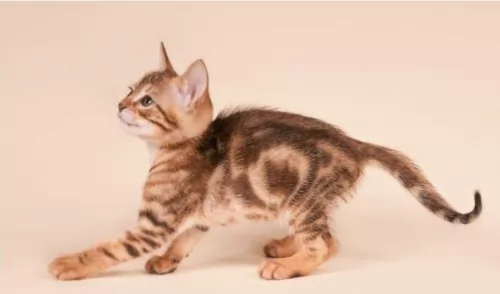 The Sokoke is a medium-sized cat with a long, lean body and slender legs. The hind legs are somewhat longer than the front legs. The head is smallish and round and he has a constantly alert look to him.
The Sokoke is a medium-sized cat with a long, lean body and slender legs. The hind legs are somewhat longer than the front legs. The head is smallish and round and he has a constantly alert look to him.
A striking characteristic of the Sokoke cat is its tabby fur, which people say looks like the bark of a tree and it is brindle in coloring.
The tail is medium to long and the ears are also fairly large, The eyes are large and almond-shaped and can be greenish to brown. The coat is short and coarse.
Cat lovers enjoy these playful, curious, intelligent, and family-orientated cats. In spite of their wild side, they adapt easily into different homes.
They’re inquisitive and will follow you, much like a dog. They will even enjoy a leash being put on them and being taken for a walk. They’re very sociable and vocal too and get on with everyone, children and other pets included.
They’re playful cats, loving to jump and climb and then look down at you from their high perches. Easily bored, you will need to provide fun and games continuously.
They enjoy being involved with everything you’re doing and form a strong bond with their owners. Because the Sokoke is social and affectionate, they require quite a lot of attention, and if they don’t get the attention they crave, they meow in anxiety.
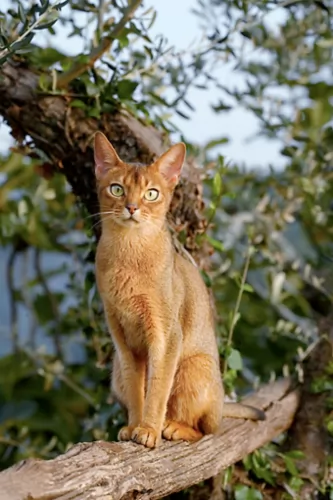 Your active Abyssinian cat is such a pleasure to have in the home as these cats love their human family as well as other pets in the home.
Your active Abyssinian cat is such a pleasure to have in the home as these cats love their human family as well as other pets in the home.
He’ll talk to you in a quiet way. They’re playful cats and you want to make sure you supply him with some stimulating toys.
Remember to brush his coat gently and make it a special therapeutic, bonding time. Make sure your active cat has exercise and provide some climbing equipment for him. Most of all he just wants to be around you and to get your loving attention.
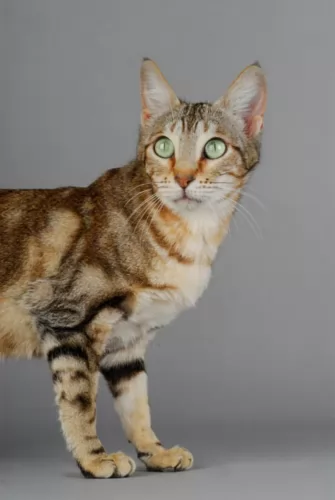 Your Sokoke is a very social cat and he will get on particularly well in a home with children who have been taught to be kind and gentle with animals.
Your Sokoke is a very social cat and he will get on particularly well in a home with children who have been taught to be kind and gentle with animals.
They are able to adapt well to homes where there are other pets too. They just love exercise and lots of fun. They don’t like being in a home where the owner is out at work all day. The solution to this is to provide him with another cat as a companion.
Sokoke cats are great with people of all ages, and when you bring one of these lively cats into your home, make sure he also receives his share of love and companionship.
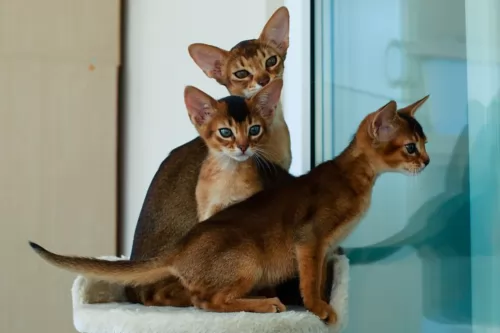 The Abyssinian has been known to be prone to kidney disorders. It can also be prone to gingivitis which can lead to periodontal disease.
The Abyssinian has been known to be prone to kidney disorders. It can also be prone to gingivitis which can lead to periodontal disease.
Also, the Abyssinian has been known to have problems with blindness. An eye problem, called progressive retinal atrophy is where the cells deteriorate over time and this is what causes the blindness.
The Abyssinian can also be prone to patellar luxation where the kneecap can become dislocated.
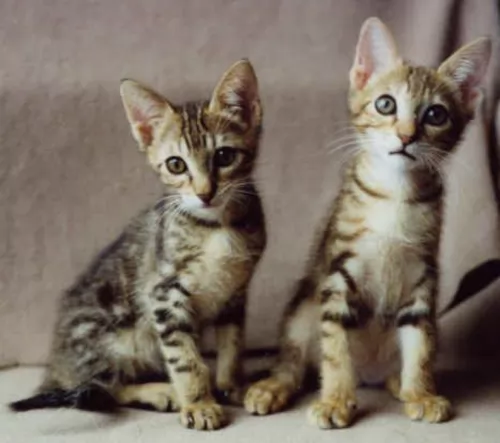 Sokoke cats are generally healthy and have no inherited diseases. To ensure that your Sokoke stands a chance of having a healthy life, you need to have him vaccinated against the life-threatening cat diseases there are.
Sokoke cats are generally healthy and have no inherited diseases. To ensure that your Sokoke stands a chance of having a healthy life, you need to have him vaccinated against the life-threatening cat diseases there are.
If your Sokoe cat isn’t his usual self day after day, make a point of getting him to the vet just as soon as possible.
Parasites are a terrible scourge with cats, and in fact, the number one cause of hair loss in cats is fleas. The bite of a flea can cause an allergic reaction. Your cat can become miserable with continuous biting, itching, and scratching and this can all lead to hair loss.
It is a wise move to speak to your vet about a good product to treat your furry friend with.
There can actually be many causes of diarrhea in cats and one of them is parasites, but it can also be caused by a viral infection or food allergy or something else.
You want to get your cat to the vet who can help you bring it under control. You may also have to feed your cat a bland kind of diet to help the cat’s digestive tract recover from the diarrhea.
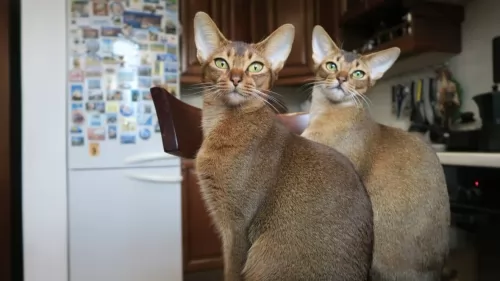 The Abyssinian cat’s short, fine coat is easy to care for. Brush and comb it timeously to remove loose hairs.
The Abyssinian cat’s short, fine coat is easy to care for. Brush and comb it timeously to remove loose hairs.
Because of periodontal disease, brush your cat's teeth. If you feel you don’t know how to perform any of these ‘caring’ routines for your kitty kat, don’t despair as your vet can do a dental cleaning procedure as well as your pet groomers.
Your Abyssinian cat is carnivorous and will need food similar to that which they would prey on in the wild. Your cat will require foods high in protein and with added vitamins and minerals.
Avoid cat foods that add in useless fillers such as wheat and soy. It is important that you buy the right cat food for your Abyssinian, and if you’re in any doubt, speak to your vet. Make sure your cat always has access to a bowl of fresh, cool water.
Always keep your Abyssinian’s litter box spotlessly clean. You can keep a special little plastic rake to rake up the sand and rid the box of cat droppings immediately.
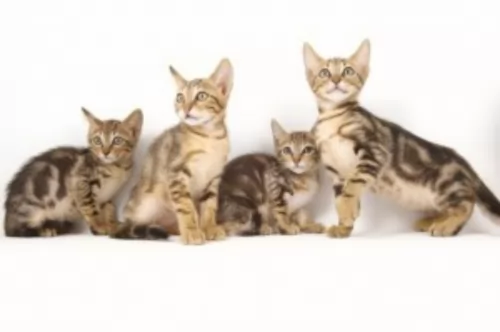 Because the Sokoke’s coat is short and close-lying, with little or no undercoat, brushing once a week will be sufficient.
Because the Sokoke’s coat is short and close-lying, with little or no undercoat, brushing once a week will be sufficient.
The Sokoke cat is very energetic, and he will need games, toys, and attention to keep him physically and mentally stimulated. They love climbing so a climbing tree and other kind of equipment will be a good idea.
Provide your cat with a litter box and ensure it is kept scrupulously clean by removing the cat’s feces every single day.
Diet is of critical importance to the health and happiness of a cat. Some people try to feed their cats human foods and wonder why their cat is continuously sick. A cat is a carnivore and he requires meat.
You can speak to your vet about the best kind of commercial cat food there is for your cat. Read the label and feed him portion-sizes as directed.